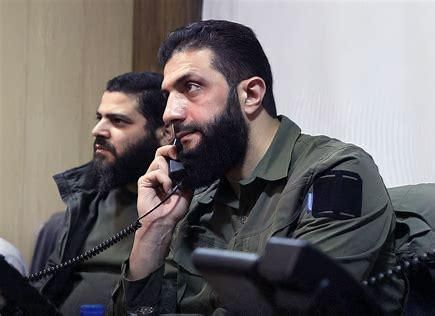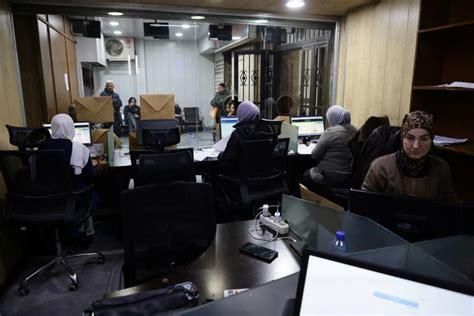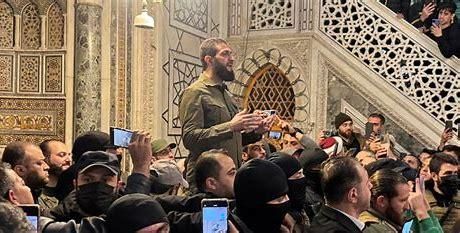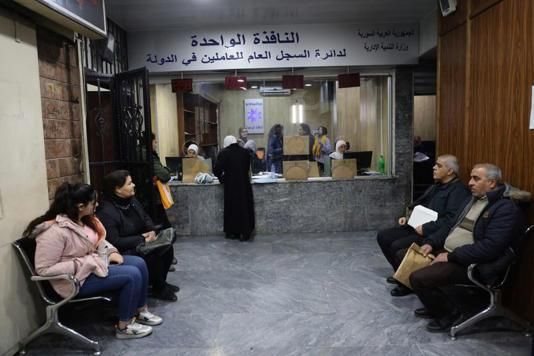By Eric Vandenbroeck and co-workers
In December 2024, a
handful of rebel groups led by Hayat Tahrir al-Sham ousted the brutal
dictatorship that had ruled Syria for five decades and set up an interim
administration. Now, foreign countries are trying to steer Syria’s new de facto
leaders toward an inclusive government free of sectarian reprisals and away
from extreme forms of Islamism. The head of HTS and the president of Syria’s
transitional government, Ahmed al-Shara, who previously went by the name Abu
Mohmmad al-Julani, has publicly endorsed this vision. However many observers
remain skeptical
of his promises to share power because HTS began as an affiliate of al
Qaeda and is designated by many Western governments as a terrorist
organization.
Helping Syria break
its cycle of violence and repression will require understanding how members of
HTS and other rebels perceive the conflict and what motivates them. We have
surveyed and interviewed hundreds of former and active rebel fighters in Syria,
including members of HTS, in the months leading up to the offensive that ousted
Syrian dictator Bashar al-Assad and in the wake of his toppling. Our findings
suggest that for outside actors attempting to influence rebel groups, some
diplomatic tools might backfire. In particular, when
foreign governments offer traditional economic incentives to these groups, it
can inadvertently undercut the legitimacy of more pragmatic leaders. Instead of
influencing Damascus through investments or trade deals, foreign countries that
want to see a secure and inclusive Syria would be better off leveraging
symbolic diplomatic gestures and providing unconditional humanitarian aid.
Without outside help or with the wrong kind of foreign aid, Syria will be more
likely to slide back into civil war or come under the thumb of another despot.
My Enemy’s Enemy
Assad was toppled by
a loose coalition of three organizations that have a history of fighting one
another: HTS; the Syrian National Army (SNA), a militia backed by Turkey; and
Southern Operations Room (SOR), a band of fighters from the south of the country.
Unlike HTS, the other two groups are not considered to be terrorist
organizations by Western governments and are more nationalist than Islamist.
HTS was the largest and most organized group in the offensive against Assad,
but fighters from the SNA and SOR played critical roles and even reached the
outskirts of Damascus before HTS did.
Many observers doubt
that the new administration, led by HTS, will be representative of all armed
actors in Syria, let alone Syria’s broader society. Although Shara and some
leaders from the SNA and SOR announced their intention to dissolve their
existing military formations to build a new national army, it remains to be
seen whether Shara will meaningfully share power. He has already staffed
several key positions in the new national military with loyalists from HTS and
closely allied groups. One SNA fighter predicted that Shara would “consolidate
power within three months.” It also unclear how long
Shara will hold onto his position as the president of Syria. In December, he
announced that it may take up to four years to organize new elections.

HTS is not the only
potential source of trouble. Turkey’s overt support for factions within the SNA
presents another major obstacle to forming a united government. Turkey has long
sought to expand its regional influence, use Syrian fighters to do its bidding,
and prevent the establishment of an autonomous Kurdish region in Syria. Turkey
fosters factionalism by paying SNA salaries and providing the group with
military equipment. In January, Turkey touted its influence over the SNA by
announcing a raise for some of its members. Parts of the SNA are loath to
formally dissolve and join a new national military because it would mean
relinquishing some of their autonomy, submitting to their rivals in HTS, and
forgoing higher and more reliable salaries paid by Turkey.
Single-Issue Voters
With Syria’s future
up in the air, many foreign leaders are rushing to shape the country’s new
administration. Typically, governments use tools including sanctions, foreign
aid, and trade deals to influence one another. Such incentives assume that all
the players involved are rational actors who weigh costs and benefits to
optimize their self-interest. But such tools can backfire when offered to what
might be called “devoted actors”: people who are willing to fight and die for
what they consider sacred values. And according to our surveys and interviews,
94 percent of Syrian rebels, including those who took part in the offensive for
Damascus, considered the goal of liberating Syria from Assad to be a sacred
value.
A sacred value need
not be religious. Although most rebels in our sample reported being religious,
religiosity was not, by and large, statistically predictive of their
willingness to suffer to achieve their goal. The most devoted actors—that is, the most self-sacrificial and violent
fighters—were those who felt politically victimized and believed they could
achieve their aims collectively. In short, those who were highly morally
aggrieved and believed that fighting could right the injustices they have faced
were most willing to kill or die for their cause.
The singular pursuit
of ousting Assad led many fighters, especially those who fought for
organizations without terrorist designations, to change groups often, joining
whichever one they thought was the most effective against the regime. Many even
moved between Islamist and secular armed groups. Their commitment to their
political ideology was often secondary to the sacred goal of liberating Syria
from Assad. In interviews, members of the SNA expressed a willingness to
collaborate with other groups to achieve their main goal. One SNA member
described the partnership between the group and HTS as a “temporary strategic
alliance,” adding that once Assad was toppled, he would not forget “how many of
us [Shara] has killed.” Another SNA fighter said, in late 2023, “I will not
fight HTS now, but I will after Assad falls,” underscoring the fragility of
Syria’s current coalition and the extent to which the rebels will subordinate
their grievances in the pursuit of their sacred value. Both before and after
Assad’s ouster, there have been frequent clashes between the Kurdish-led Syrian
Democratic Forces, a group that controls the largely autonomous region of
northeastern Syria, and the Turkish-backed SNA factions. Continued fighting
between the two groups threatens prospects for a united Syria, and Shara has
failed to persuade the SDF to join the new national army.

Syria’s Islamist rulers overhaul the economy with
firings and privatization of state firms.
Street Cred
Now that Assad has
fallen, ideological differences among the fighters will come back to the fore.
Their diverging political aims and history of infighting could lead to another
round of civil war. To avoid this, the rebels must rally around a new sacred value:
the formation of a fair and stable government. Foreign leaders are eager to
support such an aim—but how they go about it can make the difference between
lasting peace and continued misery. When governments want to influence one
another, they lean on economic incentives, such as promises of foreign aid,
trade deals, or major investments. But using these traditional tools could
undermine the credibility of leaders in Syria, as our research has shown.
Devoted actors don’t
usually give up their sacred values for material goods. In fact, many Syrian
rebels left groups because they felt their leaders had been corrupted, often by
external powers. This was particularly true among SNA members, who thought some
of their leaders had been bought off by Turkey. They questioned, for example,
why SNA fighters had been dispatched to fight in Libya alongside militias that
Turkey backed. Leaders who lose their credibility lose their authority.
According to our surveys, the number one reason rebels abandoned their fight
was because they felt their leaders had lost their moral integrity.
Foreign governments
must be careful to not be seen as corrupting or buying off Syrian leaders.
Those who are perceived as taking foreign perks will lose their ability to
shape Syria’s future. In our research, it was foreign fighters and hard-liners—the people who make up HTS’s most battle-tested
units—who were most likely to condition their commitment to their leaders on
perceived moral integrity. The rebels most likely to reject a leader on
suspicion of corruption also tended to be the best trained and most willing to
die for their cause.

If foreign
governments are keen to influence Syria’s rebels, they would be better off
proposing symbolic but meaningful concessions, such as opening embassies in
Damascus, sending official delegations to Syria, and discreetly sharing
intelligence. The United States, for its part, has already shared intelligence
with HTS about a planned attack by the Islamic State, or ISIS, and canceled a
$10 million bounty on Shara’s head. When devoted actors are presented with
symbolic but meaningful concessions, they become less likely to support
violence and more willing to make compromises, as shown in a 2007 study of
Israelis and Palestinians by the researchers Jeremy Ginges,
Scott Atran, Douglas Medin, and Khalil Shikaki.
Naturally, foreign
countries should be cautious in rewarding the HTS-led government. They should
hold off on symbolic gestures until the new administration makes progress
toward inclusive governance, such as by protecting minorities. They should,
however, immediately offer unconditional humanitarian aid to alleviate the
suffering of the Syrian people. Our research shows that people who endure
hunger or lack shelter are left with feelings of injustice, a strong motivator
for taking up arms. Making sure Syrians have their basic needs met is both the
right thing to do and a way to help end a cycle of violence. In the long term,
Syria will need tens of billions of dollars to rebuild. Foreign governments can
promote stability in Syria by involving a cross-section of local community
members in reconstruction efforts to avoid unintentionally stoking divisiveness
and instead promote a shared cultural identity.
Misinformation is
rife in Syria, and after five decades of despotic rule, Syrians have little
trust in their institutions. Assad loyalists, Iran, and ISIS have tried to
spoil reconciliation and reconstruction by staging attacks and spreading
propaganda that portrays the new government as beholden to malign foreign
interests. Other countries must not play into this perception. Instead,
no-strings-attached humanitarian aid and symbolic concessions can help Syrians
replace Assad with a better system.

For updates click hompage here